FirstNet General Manager Talks Public-Safety Preemption, Band 14
First responders working in the aftermath of the Boston Marathon bombings know all too well the shortcomings of commercial cellular networks.
While first responders’ land mobile radios worked seamlessly following the explosions, cellphone communications were crippled by a lack of cellular service. There were even erroneous reports that the government had shut down commercial cellular networks because service was so bad.
“The commercial networks are designed for a certain capacity, and that way exceeded that capacity, so only about 2 or 3 percent of the calls were actually going through, so it looked like it was shut down,” Ronald Hewitt, director for the Department of Homeland Security’s Office of Emergency Communications, testified at a House subcommittee hearing Tuesday.
Hewitt’s office has a national continuity program that offers wireless priority service (WPS) to first responders, but there is a service charge for that capability. A lack of funding forced emergency responders in Boston to forgo that service, Hewitt said.
“But at the same time, we have FirstNet [First Responder Network Authority], you know, working with TJ and the FirstNet staff, having that 20 megahertz of spectrum set aside for public safety and the cellular band, it's going to be tremendously helpful on the day-to-day basis,” Hewitt added. “So, between the two, having FirstNet coming online to give us excess capacity and educating in that, those that do have to have cellular commercial phones, that they have WPS. So, it's really a training and exercise perspective.”
Developing a reliable and sustainable network that gives police officers and other first responders priority and preemption is key to the FirstNet initiative, TJ Kennedy, general manager for FirstNet, said Wednesday, at the fourth annual Mobile Technology Summit, hosted by AFCEA Washington, D.C.
The Benefits of Band 14
FirstNet is collaborating with the Public Safety Communications Research (PSCR) Program to conduct priority and preemption testing and explore what options are available for broadband wireless equipment, services and mobile devices.

TJ Kennedy, general manager for FirstNet
Kennedy said he’s pleased to see that some device manufacturers are beginning to incorporate Band 14 capability into their devices and that there is a growing acceptance of vendors to adhere to standards. His message to vendors: Put Band 14 in your equipment.
“Band 14 is the spectrum licensed to the First Responder Network Authority (FirstNet) to create a nationwide public-safety wireless broadband network,” Bill Schrier, senior policy adviser in Washington state’s Office of the Chief Information Officer, wrote in a 2013 blog post. “Band 14 represents 20 MHz of highly desirable spectrum in the 700 MHz band that provides good propagation in urban and rural areas and decent penetration into buildings.”
Schrier noted that while first responders will have priority on network, the legislation that created FirstNet allows secondary users to have access to the network for non–public safety services.
A telecommunications provider could enter into a leasing agreement, or a public–private partnership, with FirstNet and offer services to their customers. This highly desirable spectrum could greatly benefit families, small businesses and schools in remote and rural areas.
“So, it could be argued that every wireless device sold anywhere in the United States should have Band 14 capability built-in,” Schrier wrote.
FirstNet Funding and Fees
FirstNet will serve emergency responders across the country at the federal, state and local levels. Development and sustainment of the network will come from user fees, spectrum auctions and leasing agreements, with those outside the public-safety community to pay for and use the network’s excess capacity.
“The key to making it (user fees) low is keeping cost down in building and keeping operational capabilities and leveraging of excess capacity of [the] network up, Kennedy said.
A major incentive for keeping costs low is to attract public-safety organizations to opt into using FirstNet. They are not required to use the network.
The 2012 law that established FirstNet allotted $7 billion for the initiative through Federal Communications Commission spectrum auction revenues. Based on recent auctions, it appears likely that FirstNet will receive the $7 billion in funding.









